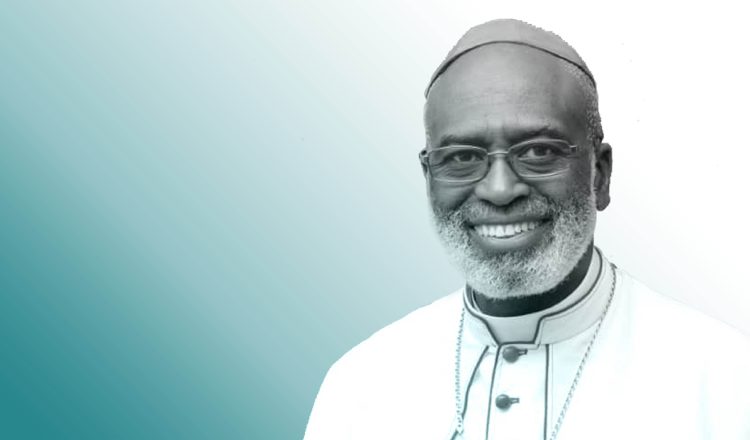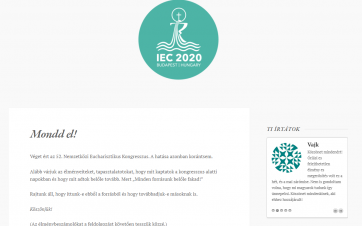
An Archbishop from the middle of the world

Two things will surely pop in mind when talking about Charles Palmer- Buckle: candor and humour. In addition to his ecclesiastical ministry he is a well-known figure for his role played in the Ghanaian public life. “If politics can be the means of encouraging people to fulfil their dreams, to support the renewal of the society, and to ensure the well-being of the humankind, then the Church will definitely take part in the political scene.”- so the Archbishop described his public engagement. During his visit to Hungary the Archbishop was interviewed by the newspaper Magyar Kurír, whereby the conversation ranged across many topics, “the political Church” amongst them in particular. “We should be present in all fronts where globalisation takes place: in the social, political, cultural, economic, and financial life of the society. We need to be there courageously, we cannot let ourselves remain outsiders. We have to bring the salt of the Gospel to the public education, and to every level where decisions of moral nature are taken. Christianity should be in the centre of life.”
Apology and reconciliation
Palmer-Buckle was born into an Anglican family, though his father had converted to Catholicism prior to his birth. Growing up in a large family with 11 siblings, he started to prepare himself for a priestly vocation already at the age of 8; as a child he was an altar boy in the very same cathedral his Archdiocese’s seat is to be found today. He was only 13 years old when he started his Minor Seminary studies, thereafter was sent to Rome by his Bishop, where he was studying Philosophy and Theology. He was ordained priest at the age of 26, then in 1993 was ordained the first Bishop of Koforidua, Ghana. Archbishop of Cape Coast since 2019.

Between 2002 and 2004 he also served as one of the nine-member National Reconciliation Commission (NCR) of Ghana. He apologised on behalf of the Africans for the part Africans played in the slave trade. He noted and was of the belief that such an apology was necessary to reach reconciliation and recovery. His apology was accepted by John Richard, Bishop of Florida on behalf of the Afro-American Catholics. The “middle of the world” as his Equator located country is referred to by Charles G. Palmer-Buckle, Archbishop of Accra. By territory, Ghana is three times larger than Hungary, with a population of 30 million. Until 1957 the country was part of the British colonial empire, while the Catholic Church has existed since 1880. Minor Seminaries are operated in almost every of the country’s 20 dioceses, where education is available from the age of 14. In the Archdiocese of Accra, 8 male and 22 female congregations are operating. Archbishop Palmer-Buckle is going to ordain 10 Diocesan priests and 8 monastic priests within the coming summer of 2021. In Ghana the relationship between the Church and State is really good, the latter one takes a significant part in maintaining and operating religious institutions – like universities, hospitals, social services, schools.
“Without being fond of the Virgin Mother, one cannot be a good priest.”
Upon the invitation of Cardinal Péter Erdő, Charles Palmer-Buckle, Archbishop of Accra paid a visit to Hungary in 2018. The African Most Reverend was hosted by Archbishop Csaba Ternyák in Eger. The two of them were ordained Bishops together by Saint Pope John Paul II, almost 3 decades ago. The African Archbishop presented a lecture in the Seminary of Eger, touching on subjects like Christianity in Europe, on the situation of which worries and concerns were expressed. It was clearly noticeable that the Church in Europe has been on the way to retire from public life and moving into privacy. When young, in Africa they all admired Europe, the Christian continent, while nowadays this Christianity is likely disappearing. The soon to-be priests could hear about a spiritual crisis the Archbishop also went through. It happened in 1974 during his studies in Rome. One day the young seminarian, dressed in civil by chance, was approached by a seer: “A seminarian who does not love the Virgin Mother cannot ever be a good priest.”
He had a deep meditative reflection on what he had heard, since the man could not have the slightest idea of his future-to-be vocation. On the way home, an elderly lady was praying the Rosary on the bus. She looked at him and repeated the very same the seer had said to him sometimes earlier the day. Then Charles Palmer-Buckle has allied himself with Mother Mary and has been praying the Rosary daily ever since.
The Archbishop often described in interviews his strong belief in humankind. “Humanity is capable of a lot more than it has achieved so far. […] Humanity is like a piano keyboard. One cannot play alone with the white keys, nor can play alone with black ones, but with the black and white keys together, and that composes a perfect and beautiful harmony.” “Peaceful coexistence is possible, but only if we come together and do it together” - emphasized Palmer-Buckle.
Aid under unacceptable conditions
The Ghanaian Archbishop is definitely up against the efforts such as promoting abortion or same-sex marriage in Africa. He is of the view that Western nations are deliberately trying to undermine traditional values with a weird campaign, what’s called the “new global ethic”. In an interview with John Allen, Vatican specialist and a correspondent for the National Catholic Reporter newspaper Palmer-Buckle talked about this Western propaganda that is propounded and supported by the United Nations (UN), the IMF and the European Union. He also expressed his concern that governments of certain European countries with Christian roots have been talking in a way that has stood in sharp contrast with that of the missionaries’ preaching. Europe provides an aid to Africa only under conditions and requires in return anti-Christian principles adoption, such as: defining abortion as a fundamental right, or considering pregnancy to be a disease and so can be terminated. “But they are not only trying to influence the parliament itself, but they are out there corrupting the youth. I know some non-governmental organizations (NGOs) that are not only supplying condoms, but also lubricants for boys, who want to engage themselves in homosexual relations. I know it. They are distributing these out for free. I also know NGO workers, hanging around with boys in order to introduce them among homosexuals.” […] “What’s happening is against our culture, and nobody is going to convince me that this is not a deliberate will.”
The Archbishop is of the opinion that young people, the ones who are supposed to be the flag holders of Africa, have no solid values to uphold, they are uncertain and gullible in many ways, thus being the most vulnerable to these NGOs. Still, apart from all above, the African Church is able to address more and more people, the Catholic religion is rather attractive amongst the youth. The African liturgy is vital, the ceremonies are filled with joy, songs, dances and happiness. A Sunday Mass in Ghana lasts 2 hours a minimum, priest ordaining is a 6 hours long ceremony.
Reggae in the evangelization
Palmer-Buckle conveys his messages even through Reggae Music. The Archbishop is a Bob Marley fan, so he has performed the Reggae King’s “Redemption song” at many places already. At Easter 2017 at the end of his interview with Kafui Dey to the GHOne TV channel they were singing together the famous Redemption song. (Click here to see the show). Since the Most Reverend could not hide his love for this music, the very same year, at a Golf Championship in Accra, in sweat shirt and white baseball cap, in one hand the microphone, the other one was raised to the sky he performed this song amid the audience’s applause and joyful cries.
Regarding the cultural and mental slavery he often refers to the song, in particular one of its lines: “Emancipate yourselves from mental slavery, none, but ourselves can free our minds.”
There is a need for self-esteem and self-dignity
The Archbishop has also intervened in order to reduce the extreme high emigration. As for one of the reasons, he was of the view that Ghana had been under British authority for too long. Moreover, he finds it absolutely inappropriate that African people intend to search their prosperity “elsewhere”, in another continent. He is convinced that Africa should rely on itself and above all, has to discover its own inner values. The continent has to do all its best to make the youth feel at home in their own country, they should be educated and trained locally, so to support the development of their own nations. “Our people need self esteem and self-dignity, to know that they have something to contribute. We have to feel good not only in our own skin, but where we come from. We need to experience all that as a real treasure.”
Sources: youtube, modernghana.com, magyarkurir.hu, ncronline.org,
commonwealmagazine.org
Photo: Magyar Kurír, IEC










